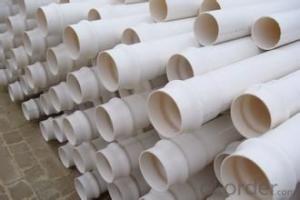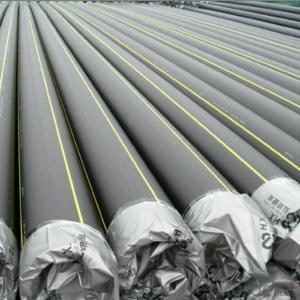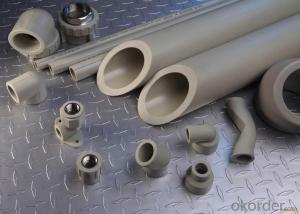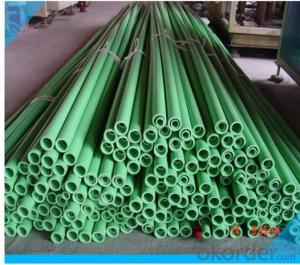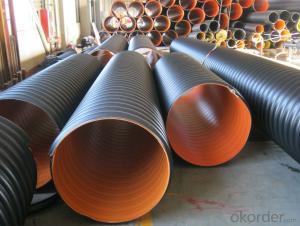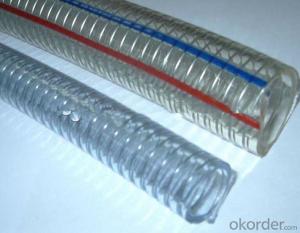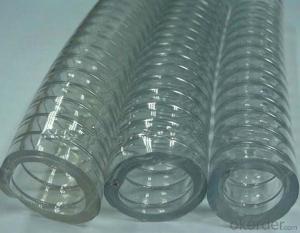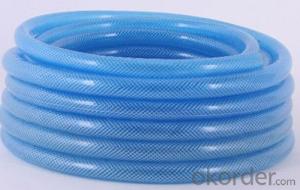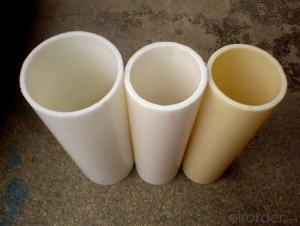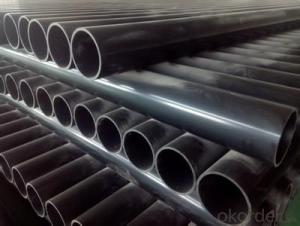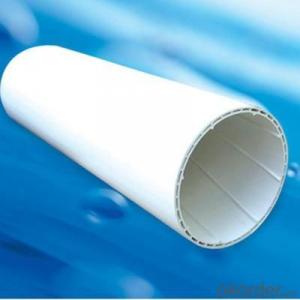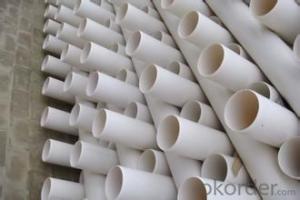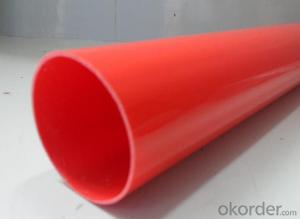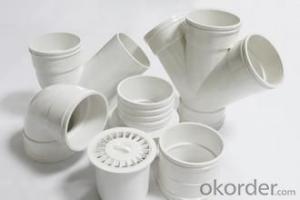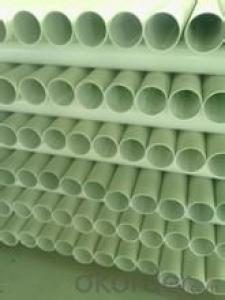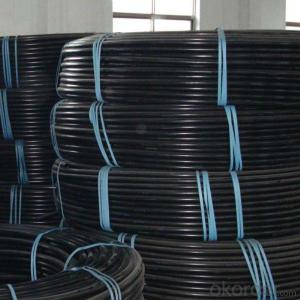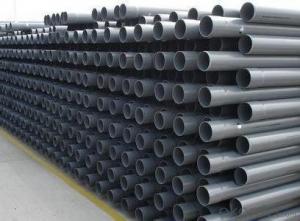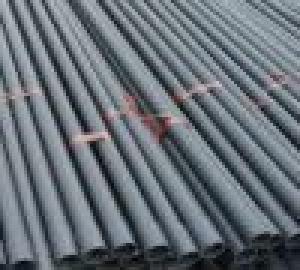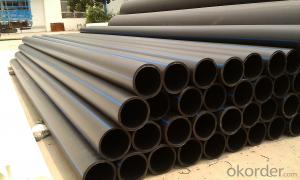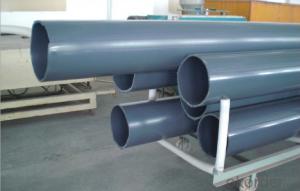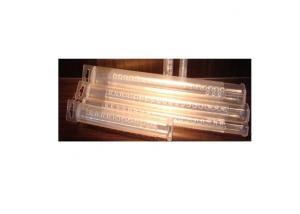Plastic Tubes PVC Pipe 0.63-2.0MPA Material PVC Specification:16-630mm Length:5.8/11.8m Standard:GB
- Loading Port:
- Tianjin
- Payment Terms:
- TT OR LC
- Min Order Qty:
- 1 m
- Supply Capability:
- 9999 m/month
OKorder Service Pledge
OKorder Financial Service
You Might Also Like
Quick Details
Place of Origin: Beijing, China (Mainland) Material: PVC Specification: 16-630mm Length: 5.8/11.8M Standard: GB
Packaging & Delivery
Packaging Details: coils in plastic bag
Delivery Detail: 15- 20 days
Specifications
PVC Pipe
1,16-630mm;
2, Wall thickness:1.6mm-26.7mm;
3, Pn:0.63-2.0MPa;
4, Length:5.8/11.8M
Features:
**Sizes: 16 to 630mm
**Pressure Rating: 0.6MPa, 0.8MPa, 1.0MPa, 1.25MPa, 1.6MPa
**Colors: white, grey, red or other colors on request
**Connection: socket fusion joint
**Standard: GB
**Certification: ISO9001, ISO14001
**Packaging: coils in plastic bag or as your request
Advantages:
**Corrosion Resistant: resist chemical matters or electron chemical corrosion
**Higher Flow Capacity: smooth interior walls result in lower pressure loss and higher volume than metal fittings
**Lower Installation Costs: light weight and ease of installation can reduce installation costs by as much as 50% over metal fittings
**Longevity: more than 50 years under proper use
**Environment-friendly: PVC-U drainage fittings can be recycled
Application
water pipe network system, industrial liquids transportation, Agricultural irrigation pipe and sewage treatment
- Q: Are plastic tubes suitable for use in the automotive industry?
- Yes, plastic tubes are suitable for use in the automotive industry. Plastic tubes offer several advantages such as being lightweight, resistant to corrosion, and easy to install. They are widely used in various automotive applications, including fuel and brake lines, coolant systems, and air intake systems. Additionally, plastic tubes can be manufactured to meet specific performance requirements and are often more cost-effective compared to other materials.
- Q: Why fire water pipes do not use PVC plastic pipes?
- Because of the lower level of safety guarantee, the water for domestic use can be maintained without water at any time. Therefore, fire pipe network requires steel pipe instead of PVC pipe.
- Q: Can plastic tubes be used for pneumatic conveyance?
- Yes, plastic tubes can be used for pneumatic conveyance.
- Q: I'm Assistant Directing a production of Hairspray! and need to find a piece of tube that a person can stand inside of for the Giant can of Ultra Clutch Hairspray. We thought to use huge cardboard tubes from Home Depot but the largest size they had was only 1' diameter. Corrugated plastic tubes wont work, it needs to be smooth like PVC or cardboard. A wood tube would be okay too
- Sonotube commercial concrete forms might have something that big. You can call them toll free at 888-766-8823 and find the name of the local distributor.
- Q: Are plastic tubes suitable for use in the aerospace industry?
- Yes, plastic tubes are suitable for use in the aerospace industry. Plastic tubes offer various advantages such as being lightweight, corrosion-resistant, and cost-effective. They are commonly used in applications where weight reduction is crucial, such as fuel and hydraulic systems, ventilation, and electrical wiring. However, the specific choice of plastic material will depend on the specific requirements and conditions of the aerospace application.
- Q: What are the different shapes available for plastic tubes?
- There are various shapes available for plastic tubes, including round, oval, square, rectangular, and triangular.
- Q: How are plastic tubes filled with liquids or semi-liquids?
- Plastic tubes are typically filled with liquids or semi-liquids through a process called liquid filling. This process involves using specialized equipment, such as filling machines or pumps, to carefully fill the tubes with the desired substance. The liquid or semi-liquid is usually poured or pumped into the tubes, ensuring proper measurements and avoiding any spills or air bubbles. Once filled, the tubes are sealed to prevent any leakage or contamination.
- Q: The iron pipe is rusty. How can the plastic pipe be connected?
- In addition to the external thread of plastic pipes also need to wrap anti Water Leakage tape to butt in the wire, and then tighten the external thread at the other end of the plastic pipe on the same around the anti Water Leakage tape, the last second of silk, finally in the external thread tap wrap tape and anti Water Leakage. The other end of the wire tightening, open sluice, test whether there is a Water Leakage place, if not, then you can use the
- Q: How do you prevent plastic tubes from warping?
- To prevent plastic tubes from warping, it is important to avoid exposing them to high temperatures or extreme changes in temperature. Additionally, storing them in a cool and dry environment can help maintain their shape and prevent warping.
- Q: Can plastic tubes be used for 3D printing filament?
- Yes, plastic tubes can be used for 3D printing filament. However, it is important to choose the right type of plastic tube that is compatible with the filament material being used and can withstand the high temperatures involved in the 3D printing process.
Send your message to us
Plastic Tubes PVC Pipe 0.63-2.0MPA Material PVC Specification:16-630mm Length:5.8/11.8m Standard:GB
- Loading Port:
- Tianjin
- Payment Terms:
- TT OR LC
- Min Order Qty:
- 1 m
- Supply Capability:
- 9999 m/month
OKorder Service Pledge
OKorder Financial Service
Similar products
Hot products
Hot Searches
Related keywords
